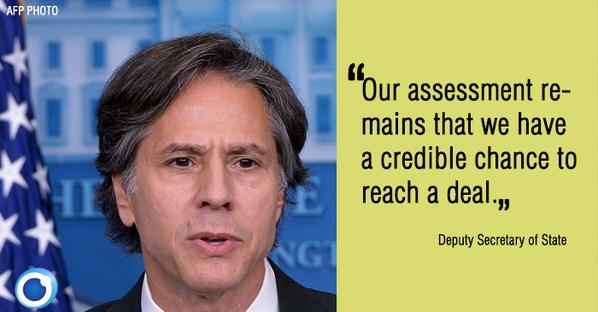 The United States says the P5+1 group of world powers and Iran have a "credible chance" to strike a comprehensive nuclear deal in the coming months.
The United States says the P5+1 group of world powers and Iran have a "credible chance" to strike a comprehensive nuclear deal in the coming months."Overall, our assessment remains that we have a credible chance to reach a deal," Deputy Secretary of State Tony Blinken told the Senate Foreign Relations Committee on Wednesday.
He also stressed that a possible agreement would be in the best interests of America's security, as well as that of our allies and partners.
Iran and the P5+1 group - the US, France, Britain, Russia, China and Germany - are in talks to work out a final deal aimed at ending the longstanding standoff over the Islamic Republics nuclear program.
Blinken added that the two sides would conclude the major elements of a deal by the end of March and the technical details by June.
The comments came a day after US President Barack Obama threatened that he would use his veto power to thwart any bill that would place additional sanctions on Iran over its nuclear program.
New sanctions passed by this Congress, at this moment in time, will all but guarantee that diplomacy fails," Obama said during a Tuesday speech before a joint session of the House of Representatives and Senate, adding , That is why I will veto any new sanctions bill that threatens to undo this progress.
Obama said that Iran and the P5+1 have a chance to reach a comprehensive agreement by this spring.
Obama warned that any new hostile move against Iran would "alienate" the United States from its allies and ensure that "Iran starts up its nuclear program again."
The White House and Congress remain divided over Iran, with a bipartisan group of senators pushing a new round of sanctions against Tehran.
Political directors of Iran and the P5+1 states wrapped up their talks in Geneva, Switzerland, on Sunday.
The latest talks included lengthy meetings between Iranian Foreign Minister Mohammad Javad Zarif and US Secretary of State John Kerry in Geneva and Paris.
This was the second round of discussions since Tehran and the six world powers failed to work out a permanent nuclear deal by last Novembers deadline despite making some progress.
The two sides decided to extend their talks for seven more months until July 1, with the interim deal they had signed in Geneva in November 2013 remaining in place.
Tehran and the six countries now seek to reach a high-level political agreement by March 1 and to confirm the full technical details of the agreement by July 1.
The scale of Irans uranium enrichment and the timetable for the lifting of anti-Iran sanctions are seen as major sticking points in the ongoing negotiations.
By Press TV
The Iran Project is not responsible for the content of quoted articles.











